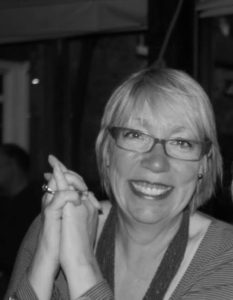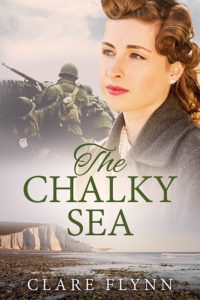I’m not sure how it happened, but suddenly Canadian guys in European wars are a hot commodity. First it was the Newfie boys in Jeff Walker’s “Not One of Us the Same.” (Read my interview with him here...) Now it’s a different world war, but Clare Flynn brings us her romance set in the English seaside, “The Chalky Sea.”
So, what’s your story, Clare?
 I live on the south coast of England – Kipling’s “Sussex by the Sea”, in Eastbourne, a seaside resort with a Victorian pier and a beautiful seafront bandstand built in 1936. I moved back here just over a year ago from London. I spent my teenage years in the town and always loved the South Downs and the sea – both of which are outside my windows and I can hear the screams of seagulls as I write this. I have used the town as the setting for my latest book, The Chalky Sea – although I had not planned to do that when I moved here.
I live on the south coast of England – Kipling’s “Sussex by the Sea”, in Eastbourne, a seaside resort with a Victorian pier and a beautiful seafront bandstand built in 1936. I moved back here just over a year ago from London. I spent my teenage years in the town and always loved the South Downs and the sea – both of which are outside my windows and I can hear the screams of seagulls as I write this. I have used the town as the setting for my latest book, The Chalky Sea – although I had not planned to do that when I moved here.
I am now writing full-time, after a long career in Marketing and then as a strategy consultant with my own business. My career took me to some wonderful places – I lived in Paris, Brussels, Milan and Sydney and did a lot of travelling all over the world for both business and pleasure.
I write historical fiction, often about displacement and with a strong sense of place. The Chalky Sea is my fifth novel and I have also published a collection of short stories.
What’s your book about?
It’s the wartime story of two people.
Gwen is a thirty-something Englishwoman whose husband has just headed off to war. She is stranded in Eastbourne – by choice, working for the Women’s Voluntary Service and training as a fire warden and subsequently as a translator of German signals. The war gives her a purpose her peacetime life has lacked. Gwen appears emotionally cold, having bottled up her feelings for years.
Jim is a young Canadian farmer from Ontario. He joins up on the spur of the moment after an unpleasant discovery that makes him want to get as far away from home as possible. He arrives in England expecting to fight and caring little if he dies – only to find himself kicking his heels in Aldershot like most of the Canadian army, performing endless exercises far away from the front. Eventually the two story strands come together and we see how the war changes each of them. These are people who in normal circumstances would never have met.
Ah yes, because when you think romance, Canadians leap immediately to mind…. Besides our natural magnetism, what is it about the time period or the story that intrigues you?
I never intended to write a book set in the `Second World War. In fact I’d always  shied away from it. It seemed too big and in some ways too recent – my father was a pilot in the RAF and my Mum was evacuated as a child. When I moved to Eastbourne I discovered that the town had a little known significance in the war – noted for being the most frequently raided in the south-east of England. Almost two hundred people, mostly civilians, lost their lives in bombing raids and there was wholesale destruction of homes and many notable buildings including the town’s library, fire station, two churches and many shops. German bombers even machine-gunned people in the streets and one of the worst raids happened while people were doing their Christmas shopping in Marks & Spencer – completely destroying the store.
shied away from it. It seemed too big and in some ways too recent – my father was a pilot in the RAF and my Mum was evacuated as a child. When I moved to Eastbourne I discovered that the town had a little known significance in the war – noted for being the most frequently raided in the south-east of England. Almost two hundred people, mostly civilians, lost their lives in bombing raids and there was wholesale destruction of homes and many notable buildings including the town’s library, fire station, two churches and many shops. German bombers even machine-gunned people in the streets and one of the worst raids happened while people were doing their Christmas shopping in Marks & Spencer – completely destroying the store.
The other little known fact was that Eastbourne was home to thousands of Canadian soldiers during the war, with troops moving in and out of the town and its surrounds constantly from July 1941 until just before D-Day. I discovered that the Canucks of the 23rd Field Regiment used to drink in both my two local pubs, the 31st and 46th Batteries preferring The Ship with the 83rd Battery favouring The Pilot, which they treated as a second home. They used to park their tanks on the local streets (destroying much of the old Victorian brick paving) and there was an officers’ mess in one of the houses in my road. The first German plane shot down over the town during the Battle of Britain landed in the playing field of the school down the road. How could I resist?
Good point. Without giving away the store, what’s your favorite (or favourite) scene?
Oddly enough it was a scene I wrote in my final revisions. It happens in the nearby port of Newhaven on the day of the ill-fated and tragic Dieppe raid in which around nine hundred Canadians lost their lives. My scene is at the harbour as the ships return bearing dead, wounded and survivors. I had “under-written” this, skating over it too quickly, despite one of the key characters being directly involved in the raid. Fortunately my editor called me on it – I immediately knew she was right and still can’t understand why I had missed something so obvious. I sat down to rework the scene and I hope that this time around I did it justice.
I also enjoyed writing a lot of the Aldershot scenes. When I realised some of the book would need to take place there I wasn’t exactly thrilled. Aldershot was another place I once lived in (aged about seven!) and it was singularly unmemorable – basically an army garrison town. As the poor old Canucks nearly went out of their minds with boredom there, I thought I would too – but I ended up really enjoying writing the Aldershot chapters. A character, who was meant to feature briefly in one scene, elbowed me out of the way and wouldn’t get out of the book. She has now forced her way into being a main character in the sequel I’m working on now, set in Canada.
Where can we learn more about The Chalky Sea and your other books?
The Chalky Sea is available as a paperback (ISBN 978-0-9933324-3-2). Online as an e-book it is exclusively on Amazon at the moment http://mybook.to/chalky sea
You can find out about me via my website which is http://www.clareflynn.co.uk
Or my Amazon author page http://author.to/clarefly
Goodreads https://www.goodreads.com/author/show/6486156.Clare_Flynn
And Twitter https://twitter.com/clarefly